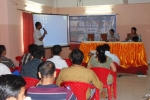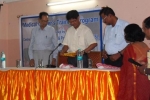
Medical Officers Training Programme
A two day Medical Officers training programme was organized by C-NES in association with NRHM, Govt of Assam, on 3rd and 4th June at Hotel Orchid, Guwahati. The training dealt with issues related to reducing Maternal Mortality Rate(MMR) Infant Mortality Rate(IMR) and Total Fertility Rate (TFR) in the thirteen Boat Clinic operated districts in Assam, issues extremely relevant to the state. 25 Medical Officers and 4 District Programme Officers from the 15 Boat Clinic units along with members from the PMU were present at the training programme.
The Mission Director, NRMH, DR JB Ekka present at the training said that he was happy to be here with the “special team of doctors” as their work “was special and different, working as they were, under extremely challenging conditions”. Everywhere in India and abroad the Boat Clinics are being appreciated and there have been talks of their being replicated outside Assam. He added that MMR and IMR are indicators of the health system and Assam being way down in the country on both with MMR at 480 per 10,000,00 live births and IMR at a dismal 61 per 1000, the state needs to focus on maternal and child health. He said that NRHM would soon start a system of tracking every pregnant woman with new software so that ante natal checkups crucial to prevent maternal death are availed by all pregnant women. For routine immunization for children, a data base will be developed so that drop outs were reduced. He emphasized on the need to promote family planning in the Boat Clinic districts and hoped that the training will be useful equipping the doctors better to meet their challenging work and serve the community with renewed vigour. Dr Ekka also inaugurated a booklet on Family planning (FP) published by C-NES, funded by PFI for Ashas, AWW, change agents and FP counsellors, on the occasion.
Earlier addressing the young doctors in his inaugural speech, noted academician, C-NES Advisory Council Member, Udayon Mishra said that they were fortunate to get involved in this kind of work, where they were not just confined to academic figures but were into the reality scenario. He congratulated them for choosing to be part of the boat clinics. Appreciating the vision and the untiring efforts of the C-NES Managing Trustee Sanjoy Hazarika in translating his innovative concept of the “Ships of Hope” into reality and said, “Lots of people have ideas, very few have the consistency and the luck to translate these ideas to reality.
The welcome address at the training programme was delivered by Bhaswati Goswami, Communications Officer, C-NES where in she briefly outlined the growth of the organization from 1 district, 1 Boat in 20005 to 13 district s and 15 Boat Clinic units .She particularly welcomed the new and only lady doctor to join the C-NES family, Dr Subhamitra Choudury, MO Dhubri Boat Clinic.
Sanjay Sharma, Associate Programme Manager, C-NES made a presentation on the background of growth and achievements of the Boat Clinics during the last three years.
Dr P.N.Bora, State Programme Manager, NRHM present at the training as a resource person spoke on Mother and Child care, Family Planning and NRHM. Lamenting about the poor health status of women and children in isolated regions, he said that the health status of a woman decides the social and cultural advancement of a society. So we have to first start with safe motherhood as only a healthy woman will bear a healthy child. Along with checking up patients and prescribing medicines, the doctors were asked to follow up cases on subsequent visits and give patients a hearing (counselling if necessary) after screening for genuine patients. They should stop indiscriminate use of antibiotics. He stressed on the need to better IMR, MMR and stop population explosion. The first pregnancy check up should be before 12 weeks wherein the woman should be registered. A Mamoni booklet with pregnancy guidelines and nutrition should be given. He added that 70% pregnant women from the rural areas are anaemic, so guiding them on an affordable nutritious diet comprising of locally available food items was important. Family planning should be a social responsibility, he said. The early marriage system prevalent in the char areas was one of the main factors contributing to this and the Boat Clinic heath teams led by the MO need to give awareness on family planning and the devices available to eligible couples, incorporating family planning in ANC, PNC sessions also.
Advisory Council member Dr Milon Baruah, Retired Superintendent, Marwari Maternity Hospital present at the training, thanked the doctors for the “wonderful work” they were doing. He spoke about his work at the Marwari Maternity Hospital where along with his team, he worked for a similar health outreach programme for women from rural areas along with family planning issues.He said that most maternal death cases were related to the mother being anaemic and that doctors should be on alert when they come across an anaemic woman during ANC checkups. He highlighted the importance of maintaining the regularity of camps and about how his team would get back to the site every 14 days, asking people the convenient time for holding a camp. He cited an instance where shifting the camp timings from 11am to 2 pm made a big difference with a huge turn out in the camps as the earlier timing was clashing with a village haat, so local conditions have to be taken into account before planning health camps.. He stressed on the importance of ensuring that all infants were given the BCG vaccines along with the rest of the vaccines.
Dr B C Bora MO, Dibrugarh Boat Clinic, highlighted his experiences on the boat clinics- of the action plan being made beforehand and checking whether medicines, vaccines all were ready before they set off for the 3-4 day trip He said that GNMs, ANMs should be actively involved in making the action plan all should be present to get the real picture. He also spoke about how after delivery due to superstitions new mothers do not come out for PNC.
Dr Kamal Khound from the Malaria control department spoke about malaria transmission processes and how to prevent and control the menace of malaria. He mentioned about need for training Boat Clinic Laboratory technicians. Dr A Sarma, Consultant, NRHM spoke on Child health and new born care emphasizing the importance of exclusive breast feeding. Dr Sandip Ghosh, SPM, NRHM, spoke on Boat Clinic Action Plan and the importance of community participation in health camps. Dr S .Borah spoke on RNTCP and Vector borne diseases. Medical Officers from Barpeta Unit I Dr Arup Kalita and Dr F I Khan shared their experiences at the health camps. In their district, the Boat Clinic was covering 30 chars, all thickly populated and sometimes there were as many as 30 ANCs conducted in a day. They however get good support from the villagers, who are timely in formed by ASHAs by door to door visits. Most villagers have large families and very little spacing between children. The doctors advocate family planning measures, the need for institutional delivery and about the schemes available, PNC cases are followed up, the ANM makes home visits to give BCG to infants. During ANC check ups, personal hygiene, neo natal care, breast feeding done. For RI doctors have visited houses to convince parents. Screening of patients for GHC is done to sort out the genuine patients.
Speaking on maternal health, Dr C R Hira, Consultant NRHM said that 72% women in Assam who are pregnant and register for ANC checkups are anaemic. 86% women have never completed a course of 90 days IFA. Teenage pregnancy prevails. The Boat Clinic heath team should contact ASHAs and stay in touch with them as ASHAs are generally proactive and know the health status of the villages. Doctors need to tell the ASHAs about their role in convincing women for institutional delivery. ASHAs should report about maternal death in their area by filling in the FIR. Accurate and timely reporting is very important to stop maternal deaths. The doctors counselling approach can make a difference they should not refuse to check up the BP of any villager. He concluded with a few moving lines
“Among the poor, most rural women are the poorest
Among the hungry they are the most hungry,
Yet they share what they have
Among the educated they are the least educated,
Yet they have wisdom
Among those with ill health they are of worst health
Yet they have a strong will to survive”
For the group discussion session participants were divided into 3 groups and the topic – Contribution of Boat Clinics in reducing-a) MMR b) IMR c) TFR. Some of the pertinent points which were presented by each group after the presentations were as follow:
(Group 1) MMR
1. Counselling – to prevent early marriage
2. To bear a child only after 20 years of age
3. Early detection of Pregnant mothers and their registration
4. Mandatory 4 antenatal checkups
5. Check weight, height, age of pregnant women during registration
6. To convince pregnant women to take IFA regularly to ensure good health of the mother and child.
7. Advocating institutional delivery and motivating on the same.
8. In case of any health complications being detected during ANC , the woman should be immediately shifted to the nearest hospital.
9. PNC checksups important to reduce and eliminate complications after delivery
(Group 2) IMR
1. Education of the mother is important to reduce IMR
2. Marriageable age should be 20 years
3. Screening of the High risk pregnancy and refer cases to the nearest hospital
4. Counselling of the mother and discouraging her to seek advice from quacks
5. Institutional delivery must- awareness about this
6. Taking good care of the baby- Essential New Born Care
7. Weighing the baby
8. Promoting exclusive breast feeding
9. PNC check up of the new mother essential- must be informed about this by CW or ASHA
10. Ensure that the baby receives BCG and the other immunization doses timely.
11. IMNCI protocols to be maintained by the nurses and CWs
(Group 3) TFR
1. Eligible couples register to be prepared by conducting a survey of 15-49 years couples
2. Awareness- Street play, meetings to advocate Family Planning (FP) issues
3. Highlighting the advantages of a small family
4. Awareness about 2 child norms, spacing, contraceptive methods
5. Making people aware about the government schemes to promote family planning
6. Counselling of couples and a giving them the option to choose from a basket of FP methods
All sessions witnessed keen and active interactions between the MOs and the resource persons. The training programme concluded with a vote of thanks by Programme Manager Ashok Rao prior to which he along with Associate Programme Manager Sanjay Sharma and Assistant Programme Manager Manik Boruah summarised the days events. The resource persons were facilitated with gamochas by Chandana Borah, Family planning Advocacy and Moushumi Bora, Accounts Assistant.




